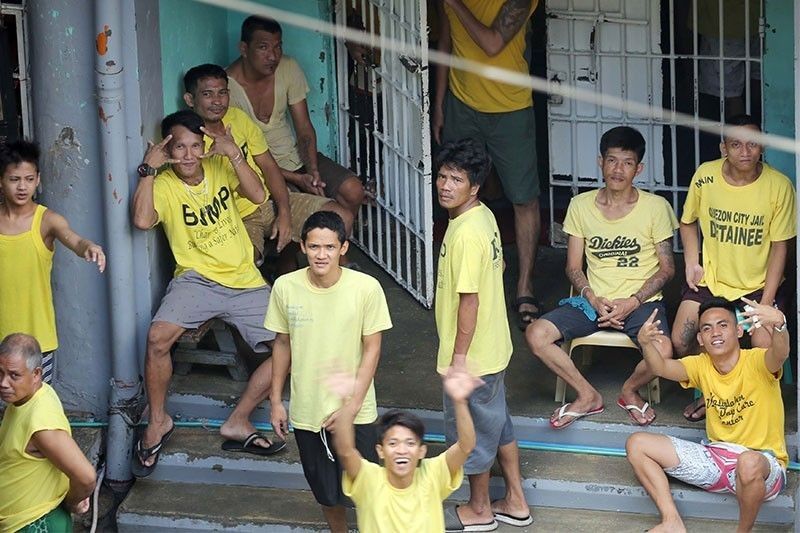SC OKs reduced bail, release on recognizance for indigent inmates

MANILA, Philippines — Chief Justice Diosdado Peralta on Thursday released new guidelines for possible release of indigent inmates to help decongest jails in this time of COVID-19 pandemic.
Peralta issued Supreme Court Administrative Circular No. 38-2020 on the “reduced bail and recognizance as modes for releasing indigent persons deprived of liberty.”
The chief justice recalled that the Court has, time and again, held that “bail is a matter of right when the offense charged is not punishable by reclusion perpetua, life imprisonment, or death.”
The SC has too ruled that the amount of bail should be reasonable at all times.
“More so during this period of public health emergency when there is a serious need to decongest our overcrowded jails and prison facilities and further prevent the spread of the virulent COVID-19,” Peralta said.
The Public Attorney's Office considers the following as indigents under its Indigency Test:
1. If residing in Metro Manila, whose net income does not exceed Php14,000.00 a month;
2. If residing in other cities, whose net income does not exceed Php13,000.00 a month;
3. If residing in other places, whose net income does not exceed Php 12,000.00 a month.
The Philippines on Thursday recorded 276 new COVID-19 infections, bringing national tally to 8,488.
Inside the country’s overcrowded jails, the Bureau of Jail Management and Penology reported nine inmates and nine staff infected at the Quezon City Jail, and more than 200 cases inside Cebu City Jail.
The BJMP recorded a congestion rate of 394% in September 2019, making the practice physical distancing and proper hygiene at all times a luxury for inmates.
Almost 10,000 PDLs recently temporarily released
The SC has since issued circulars to help decongest Philippines’ overcrowded jails include allowing electronic filing of charge sheets and transmission of release orders, reiteration of guidelines on release of qualified PDLs through self-recognizance and provisional dismissal and pilot testing of videoconference of urgent trials.
It said that Office of the Court Administrator data showed that no less than 9,731 PDLs from March 17 to April 29 2020 were released due to these directives.
Broken down, the data on released inmates is as follows:
- National Capital Judicial Region: 2,082 PDLs
- Luzon, outside NCJR: 4,657 PDLs
- Visayas: 1,072 PDLs
- Mindanao: 1,920 PDLs
In its latest circular, the chief justice introduces a new initiative where “more PDLs are expected to be released.”
“In view of the foregoing and upon consultation with the Members if the Court, considering the urgent need to further decongest our detention facilities, especially during this time of public health emergency, to promote social and restorative justice, bail and recognizance for indigent PDLs shall be granted as follows, pending the continuation of the criminal proceedings and resolution of cases against them:”
- For those charged with a crime punishable with the maximum of reclusion temporal or 12 years to 20 years, the bail shall be computed by getting the medium period multiplied by P3,000 for every year of imprisonment
- For those charged with a crime punishable with the maximum period of prision mayor or six years to 12 years, the bail shall be computed by getting the medium period multiplied by P2,000 for every year of imprisonment
- For those charged with a crime punishable with the maximum period of prision correccional or six months to six years years, the bail shall be computed by getting the medium period multiplied by P1,000 for every year of imprisonment
- For those charged with a crime punishable by arresto mayor or one month to six months, and arresto menor or one day to 30 days, they may be released on their own recognizance
Medium period of penalties is discussed in Article 76 of the Revised Penal Code.
Recognizance meanwhile is defined in Republic Act 10389 as a "mode of securing the release of any person in custody or detention for the commission of an offense who is unable to post bail due to abject poverty."
These new guidelines however do not cover those already serving sentence.
Indigents PDLs should first be arraigned—can be through videoconferencing— before they can be granted bail or recognizance, the SC said.
Those who were already arraigned and undergoing trial are covered by the said circular. If “they have already served the minimum imposable penalty for the crime for the crime they are accused,” then they are already covered of the OCA’s earlier directive.
“This is without prejudice to the exercise of the court’s discretion to deny the application for bail or recognizance if there are reasonable grounds based on prevailing jurisprudence and existing rules, and to the imposition of additional bail and conditions, or the cancellation thereof, to those who will be convicted, pending their appeal,” Peralta added.
The circular is effective immediately and may be availed only during the period of public health emergency.
- Latest
- Trending






























